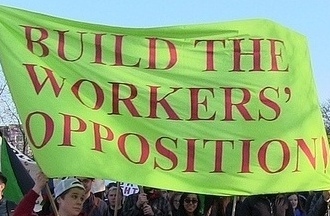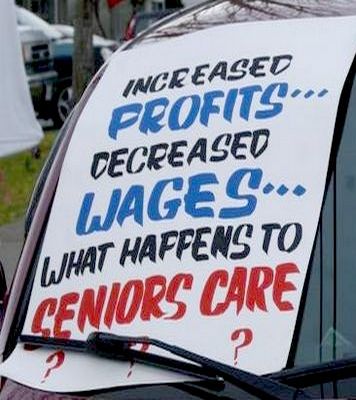|
BC Federation of Labour
Convention
Build the Workers' Opposition to
the Neo-Liberal Anti-Social Agenda
 
BC Federation of
Labour
Convention
• Build the Workers' Opposition to the
Neo-Liberal Anti-Social Agenda
• "Together -- Good Jobs Build a Better BC" --
Let's Discuss!
Crisis in BC Seniors'
Care
•
Increase Funding for Social Programs!
•
Care Aides Support Seniors - Hospital Employees' Union
BC Federation of Labour Convention
Build the Workers' Opposition to the Neo-Liberal
Anti-Social Agenda
The 56th Convention of the BC Federation of Labour is
taking place in Vancouver from November 24 to 28. Delegates from
affiliated unions and district
labour councils will deliberate on reports of the executive council of
the federation, committees of the federation, and resolutions and
constitutional
amendments submitted by affiliated unions and labour councils. The
delegates will also elect the two full time officials of the
Federation, the President and
Secretary-Treasurer.
Since the 2012 convention, the problems facing BC
workers have intensified. On the horizon is federal legislation that
will further violate workers' rights,
including Bill C-377, An Act to
amend the Income Tax Act (requirements for labour organizations),
and
other
forms
of U.S.-style "right to work"
legislation. At the federal level, workers' rights are being trampled
through muzzling,
layoffs, and attacks on sick leave and pensions.
 Provincial public sector
workers have not seen anything close to negotiations for years. Once
the Olympics were over the gloves came off and
"bargaining" in 2010, 2012 and 2014 has been a sham, with the
government dictating "net zero," followed by the hoax of "cooperative
gains," and "economic
stability." Public sector workers and their wages and working
conditions are being targeted as part of the overall anti-social attack
on social programs and
public services. The private interests and rights of large corporations
are now openly politicized while the public interest and rights of the
people are being
trampled on and depoliticized. Provincial public sector
workers have not seen anything close to negotiations for years. Once
the Olympics were over the gloves came off and
"bargaining" in 2010, 2012 and 2014 has been a sham, with the
government dictating "net zero," followed by the hoax of "cooperative
gains," and "economic
stability." Public sector workers and their wages and working
conditions are being targeted as part of the overall anti-social attack
on social programs and
public services. The private interests and rights of large corporations
are now openly politicized while the public interest and rights of the
people are being
trampled on and depoliticized.
The BC government has fully embraced the privatization
and labour trafficking low wage agenda of the Harper Conservatives.
Workers in industry and
the resource sector are facing demands for concessions, two tier
contracts, dangerous working conditions leading to injuries and death,
and denial of their
rights by Worksafe BC.
More and more the public authority is being destroyed at
the federal, provincial and municipal levels with thousands of public
sector jobs eliminated
through privatization and cutbacks under the hoax of austerity.
Workers' rights to EI and to compensation when they are injured are
being trampled
on, and other social
programs are under attack. The Temporary Foreign Worker Program
facilitates brutal treatment of foreign workers and is aimed at
lowering wages and
working conditions for all.
 In spite of government
dictate and intransigence, an advance was made this year through
determined resistance. BC workers and their allies rallied behind
the BC Teachers' Federation in its strike. Teachers, through great
personal sacrifice, did not give up their right to negotiate class size
and composition, which
was the most important concession demanded by the Clark government. In
spite of all the drivel from the government and in the
monopoly-controlled media
that teachers are greedy, unreasonable and out of step, the issue of
the right to a public education as a fundamental tenet of a modern
society and the recognition that teachers' working conditions are
students' learning conditions forced the government to back down on its
infamous "proposal" E80. In spite of government
dictate and intransigence, an advance was made this year through
determined resistance. BC workers and their allies rallied behind
the BC Teachers' Federation in its strike. Teachers, through great
personal sacrifice, did not give up their right to negotiate class size
and composition, which
was the most important concession demanded by the Clark government. In
spite of all the drivel from the government and in the
monopoly-controlled media
that teachers are greedy, unreasonable and out of step, the issue of
the right to a public education as a fundamental tenet of a modern
society and the recognition that teachers' working conditions are
students' learning conditions forced the government to back down on its
infamous "proposal" E80.
The BC Fed executive committee report and that of the BC
Federation of Labour committees provide ample examples of the
anti-worker and anti-social activities of the rich and their
representatives in all levels of government. The workers are doing
their utmost to deal with the situation in a manner that favours their
interests but they are hampered by ways of doing things from the past
which split their ranks and divert them from paying attention to what
matters. One of the major diversions is attempts to split their ranks
behind this or that political party in the upcoming federal elections.
The ruling circles are attempting to divert the workers' aspiration to
defeat the Harper anti-social agenda by feeding the myth that a new
equilibrium can be established in Canada if only we can reestablish a
two party system in which the party in power can be replaced by a party
in the opposition. This requires that the opposition not be split
between Liberals and NDP which is why workers are being mobilized in a
deadly fight to wipe out one or the other from the face of the earth.
There are indications that such a fight is being imposed to determine
the leadership of the BC Federation of Labour, as was done previously
at the Canadian Labour Congress Convention held in Montreal from May 5
to 9, 2014. More than 1,000 delegates were brought to the Convention by
various unions just for election day, all in the name of
engaging in a democratic exercise. The creation of instant delegates
and all kinds of pre-twentieth century hooligan methods completely
cheapened the delegate status of those assigned by their locals
to represent their members and participate in sorting out the problems
facing the workers' movement..
 Always the workers have
succeeded when they succeed in putting the full weight of their
abilities and the strength of their numbers and organization behind
their efforts to resolve problems in a manner which favours them. The
fight today is not for this or that party which
promotes a version of the neo-liberal anti-social agenda. Federally, we
have the Conservatives; provincially we have Liberals and, less
frequently
nowadays, the NDP. The workers can definitely exert their influence
as they did during the teachers strike by upholding principle and
putting the full weight of the workers' movement behind their just
demands. This is the way
forward! Always the workers have
succeeded when they succeed in putting the full weight of their
abilities and the strength of their numbers and organization behind
their efforts to resolve problems in a manner which favours them. The
fight today is not for this or that party which
promotes a version of the neo-liberal anti-social agenda. Federally, we
have the Conservatives; provincially we have Liberals and, less
frequently
nowadays, the NDP. The workers can definitely exert their influence
as they did during the teachers strike by upholding principle and
putting the full weight of the workers' movement behind their just
demands. This is the way
forward!
Let the BC Federation of Labour Convention be a forum where workers can
unite to take a bold step in defence of the rights of all! Uphold the
Dignity of Labour! Fight to be the decision-makers in terms of
the use of resources and to promote manufacturing and a healthy
environment as well as nation-to-nation relations with the indigenous
peoples! Fight for Public Right, Not Monopoly Right! Fight for the
right of all workers to healthy and safe working conditions, modern
standards of remuneration, working conditions security in retirement.
There is a lot to be done! Together we can do it!

"Together -- Good Jobs Build a Better
BC"
Let's Discuss!
At this convention, let us discuss what will advance the
fight against the anti-social offensive. The theme of the convention
"Together -- Good Jobs Build a Better BC" is a good place to start.
There is no doubt that good jobs build a better BC. It always has been
the case. In fact, it is so obvious one wonders what is the point of
repeating it? Perhaps the answer lies in determining what is
meant by "good jobs?" On this issue a lot of confusion exists. People
are agreed that a good job provides stability. It is well paid. It is a
union job which in turn has good benefits and provisions which defend
the workers' health and safety, and so on. With so much consensus as to
what constitutes a "good job" what then is the problem? Unless we deal
with this, we will remain stuck.
The fact is that good jobs, which are secure, can be
provided if we have a self-reliant all-sided economy free from the
ravages of recurring economic crises. We have certainly learned through
our experience of the past 20 plus years that good secure jobs are not
possible through handouts to the rich for short-term extraction and
export of BC's natural resources. We know that good secure jobs are
found in mining and processing of raw materials, transportation of
goods and people, manufacturing, and expansion of health care,
education and public services at Canadian standard wages and working
conditions. Good secure jobs in stable communities are possible with a
planned all-sided development of the economy based on processing and
manufacturing of the bounty of Mother Earth and increased investments
in social programs and public services that guarantee the well-being of
all and the humanization of the social and natural environments.
Let us think about and elaborate a direction for the
economy in opposition to the current one based on monopoly right and
paying the rich. Let's discuss the theme for the Convention of the BC
Fed: "Together -- Good Jobs Build a Better BC!"

Crisis in BC Seniors' Care
Increase Funding for Social Programs!
Care Aides Speak Out
 The government of Christy
Clark is implementing an
anti-social health
care program. This has created a crisis in seniors' care in the
province. The Liberal government anti-social campaign has opened up
what is being called the seniors' care industry to private operators.
They see the establishment of publicly-funded private seniors' care
facilities as an opportunity to increase profits for their shareholders
through guaranteed government funding as well as fees from residents
and families. The government of Christy
Clark is implementing an
anti-social health
care program. This has created a crisis in seniors' care in the
province. The Liberal government anti-social campaign has opened up
what is being called the seniors' care industry to private operators.
They see the establishment of publicly-funded private seniors' care
facilities as an opportunity to increase profits for their shareholders
through guaranteed government funding as well as fees from residents
and families.
The crisis in seniors' care is amplified with private
entrepreneurs
constantly looking for ways to maintain and increase their profits
through higher charges or user fees and cuts to services, and decreased
wages and working conditions of the workers who care for the seniors.
The crisis is made worse with a shortage of residential care beds for a
growing senior's population, a shortage identified in study after study
for over 30 years. Another aspect of the crisis is the failure to
provide home care to assist seniors to stay in their homes with support.
The crisis is not resolved because the government has
abdicated its
social responsibility to fund public health care adequately and
administer a system that is public in all its aspects, coherent,
integrated with the public health care system, available to all
regardless of individual means, and which cherishes in practice those
who do the demanding work of caring for seniors.
The lack of home care and the shortage of residential
care beds has as
one of its major results that the needs of seniors going into
residential care are much greater than they were in the past. Whereas
the majority of residents were independently mobile and did not need
assistance with meals ten or 15 years ago, the situation has changed
dramatically with many more residents requiring a greater level of care.
The government has not increased the number of workers
to meet the more
demanding needs of residents or the population. Care aides are the
workers who provide the hands-on care of residents. They provide all
the assistance needed with dressing and undressing, personal care,
feeding and all features of "activities of daily living."
The Hospital Employees Union, which represents 15,000
care aides in BC,
recently commissioned a survey of care aides that bears out what they
have been reporting; they do not have time to meet the care needs of
the residents they look after. An October 16 press release states,
"Most of those surveyed say the single most important change to improve
working and caring conditions is more staff or less workload."
A local seniors' advocacy group, Comox Valley Support
Our Seniors, did
another survey of care aides in residential care in 2013. One hundred
per cent of the care aides surveyed said that the most important need
was for more staff. Care aides who have been in their jobs for 20 years
report a substantial increase in the needs of residents. Yet, the
government has not appreciably increased the number of care aides. This
means "care" is more often than not sacrificed because of the many more
residents who need to be dressed and provided care. Care aides report
it becomes more like a production line with pressure simply to keep up.
Others comment that the main job they do now, due to the lack of staff
and the increased number of residents with dementia, is try to prevent
residents from harming themselves or others.
 The situation described by
care aides is found in both
private and
public residences. In the private residences the care of residents is
further compromised by the reduced wages and working conditions of the
workers and the resulting higher turnover of staff. This is especially
evident in those residences where the private owners have subcontracted
staffing to worker-traffickers. The plague of worker-trafficking is
becoming more and more common resulting in further reduction in wages
and benefits for the workers, greater turnover of staff and
deteriorating care for the residents. The situation described by
care aides is found in both
private and
public residences. In the private residences the care of residents is
further compromised by the reduced wages and working conditions of the
workers and the resulting higher turnover of staff. This is especially
evident in those residences where the private owners have subcontracted
staffing to worker-traffickers. The plague of worker-trafficking is
becoming more and more common resulting in further reduction in wages
and benefits for the workers, greater turnover of staff and
deteriorating care for the residents.
The demand of front line workers for increased staff to
meet the needs
of seniors and other residents is a stand in defence of the rights and
dignity of both workers who provide the care, and the seniors who
deserve the best care that Canadian society can provide.
It is not acceptable that government says that health
care for seniors
is not affordable, while diverting millions of dollars from health care
to the private coffers of the owners and worker-traffickers and
transferring public funds to pay-the-rich schemes, in particular at
this time to gigantic infrastructure projects. It is not acceptable
that front line workers are forced to put themselves at risk to do
their jobs and know that they are not providing the care that they know
is required. It is not acceptable that government does not acknowledge
and recognize in practice that seniors and the workers who care for
them have rights that must be guaranteed.
Increased government investment in public seniors' care
is necessary to
end the crisis in seniors' care and make BC society fit for human
beings. Increased numbers of care aide workers who provide this
invaluable service to society and the residents in their care are
necessary to guarantee the rights of workers and seniors. To
guarantee rights requires an end to privatization and
worker-trafficking, and the establishment and rigorous enforcement of
standards of care and Canadian-standard wages, benefits and pensions,
and security of livelihoods for those workers who provide the care.

Care Aides Support Seniors
- Hospital Employees' Union (HEU),
October 15, 2014 -
Nearly three-quarters (73.3 per cent) of B.C.'s care
aides say they are
forced to rush through basic care for the elderly and disabled,
according to a Viewpoints Research survey commissioned by the Hospital
Employees' Union.
The poll of HEU care aide members paints an alarming
picture of the
pressures faced by those who deliver the bulk of personal care to
nursing home residents, home care clients and, increasingly, to
hospital patients.
More than 70 per cent report that they do not have
enough time to
comfort, reassure or calm those they care for when they are confused,
agitated or fearful.
Half of those surveyed (54.3 per cent) report that they
do not have
enough time to adequately meet the needs of their residents, patients
or clients.
A third (32.2 per cent) say that the standard of care in
their
workplace has been getting worse over the past few years. Only 21.8 per
cent say standards are rising.
HEU secretary-business manager Bonnie Pearson says care
aides and
community health workers struggle to deliver quality care,
short-staffed, while dealing with residents with more complex care
needs including varying stages of dementia.
"The sad reality suggested by the numbers is that many
of our frail
elderly do not receive the attention they require and that our members
want to provide," says Pearson. "The situation also takes a huge toll
on care staff. When workers are rushed off their feet trying to meet
residents' needs, they put their own health at risk."
In fact more than half of survey respondents (52.7 per
cent) have been
injured on-the-job, and 83.1 per cent report that they have been
struck, scratched,
spit on or subjected to other acts of violence or aggression from a
resident, patient or client.
The solutions are clear. Most of those surveyed say the
single most
important change to improve working and caring conditions is more staff
or less workload.
The random phone survey of 602 care aides includes a
small number of
community health workers that provide similar care in home settings.
The survey took place September 16 to 25, and is accurate to within 3.9
percentage points, 19 times out of 20. HEU represents 15,000 care aides
-- about a third of the union's total membership of 46,000.
October 18 is Health Care Assistant Day, designated by
the provincial
government to recognize the contribution of care aides and community
health workers to quality care.

PREVIOUS
ISSUES | HOME
Read BC Worker
Website: www.cpcml.ca
Email: office@cpcml.ca
|



 Provincial public sector
workers have not seen anything close to negotiations for years. Once
the Olympics were over the gloves came off and
"bargaining" in 2010, 2012 and 2014 has been a sham, with the
government dictating "net zero," followed by the hoax of "cooperative
gains," and "economic
stability." Public sector workers and their wages and working
conditions are being targeted as part of the overall anti-social attack
on social programs and
public services. The private interests and rights of large corporations
are now openly politicized while the public interest and rights of the
people are being
trampled on and depoliticized.
Provincial public sector
workers have not seen anything close to negotiations for years. Once
the Olympics were over the gloves came off and
"bargaining" in 2010, 2012 and 2014 has been a sham, with the
government dictating "net zero," followed by the hoax of "cooperative
gains," and "economic
stability." Public sector workers and their wages and working
conditions are being targeted as part of the overall anti-social attack
on social programs and
public services. The private interests and rights of large corporations
are now openly politicized while the public interest and rights of the
people are being
trampled on and depoliticized. In spite of government
dictate and intransigence, an advance was made this year through
determined resistance. BC workers and their allies rallied behind
the BC Teachers' Federation in its strike. Teachers, through great
personal sacrifice, did not give up their right to negotiate class size
and composition, which
was the most important concession demanded by the Clark government. In
spite of all the drivel from the government and in the
monopoly-controlled media
that teachers are greedy, unreasonable and out of step, the issue of
the right to a public education as a fundamental tenet of a modern
society and the recognition that teachers' working conditions are
students' learning conditions forced the government to back down on its
infamous "proposal" E80.
In spite of government
dictate and intransigence, an advance was made this year through
determined resistance. BC workers and their allies rallied behind
the BC Teachers' Federation in its strike. Teachers, through great
personal sacrifice, did not give up their right to negotiate class size
and composition, which
was the most important concession demanded by the Clark government. In
spite of all the drivel from the government and in the
monopoly-controlled media
that teachers are greedy, unreasonable and out of step, the issue of
the right to a public education as a fundamental tenet of a modern
society and the recognition that teachers' working conditions are
students' learning conditions forced the government to back down on its
infamous "proposal" E80.
 The government of Christy
Clark is implementing an
anti-social health
care program. This has created a crisis in seniors' care in the
province. The Liberal government anti-social campaign has opened up
what is being called the seniors' care industry to private operators.
They see the establishment of publicly-funded private seniors' care
facilities as an opportunity to increase profits for their shareholders
through guaranteed government funding as well as fees from residents
and families.
The government of Christy
Clark is implementing an
anti-social health
care program. This has created a crisis in seniors' care in the
province. The Liberal government anti-social campaign has opened up
what is being called the seniors' care industry to private operators.
They see the establishment of publicly-funded private seniors' care
facilities as an opportunity to increase profits for their shareholders
through guaranteed government funding as well as fees from residents
and families.